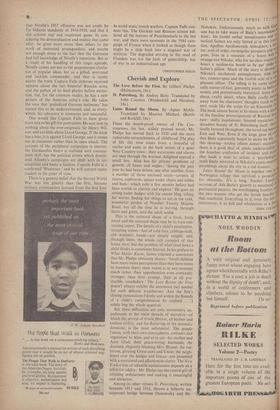Cherish and Explore
FROM the bomb-proof retreat of The Cen- tenarians, his last, widely praised novel, Mr. Phelps has moved back to 1920 and the more vulnerable entrenchments of childhood. The play of life this time issues from a houseful of uncles and aunts in the back streets of a quiet West Country town : their excursions and alarms are seen through the worried, delighted eyes-of a small boy. Alan has his private problems of growth, of knees and angles : 'during the past year he had been driven, one after another, from a number of those enclosed areas—corners of rooms, cupboards, spaces under chairs and tables and beds—which only a few months before had been worlds to cherish and explore.' He goes on sitting under hedges with his cousin Meg, telling her stories, finding her things to eat in the rank, wonderful garden of Number Twenty Majuba Road, but all the time he is moving, through hurts and guilts, into the adult world.
This is the outward shape of a fresh, lively novel and the outward shape may be its least con- vincing aspect. The details of a child's unselective, accepting vision—feel of cold lino, cabbage-stalk, old woman's hands—are deeply caught; and, through them, the whole rich complex of that house then; but the problem of what (and how) a child thinks is sometimes blurred. In his preface to What Maisie Knew, James exposed a conviction that Mr. Phelps obviously shares: 'Small children have many more perceptions than they have terms to translate them; their vision is at any moment much richer, their apprehension even constantly stronger, than their prompt, their at all pro- ducible, vocabulary.' The Love Before the First doesn't always exhibit the enormous tact needed for such delicate translations. And the boy's closing ruminations ('dimly and within the bounds of a child's comprehension he realised . .') subtly beg the whole question.
But these difficulties are only momentary im- pediments in the main threads of narrative—of which the arrival of Uncle,Hector, all leather and restless virility, and his fluttering of the domestic dovecote, is the most substantial. The people ('areas, with their own atmospheres, contours and vegetation' to Alan, and so to us)—his mother and Aunt Glad; their peace-loving husbands; the doomed, elegantly blushing Mrs. Blount; the vul- turous, gloating Great-aunt and Uncle; the neigh- bours over the hedges and fences—are presented with a restrained and affectionate clarity. The New Yorker line of infantile reminiscence depends on a relish for oddity : Mr. Phelps has the central gift of relishing ordinariness and making it meaningful and attractive.
Among its other virtues St. Petersburg, written between 1913 and 1916, throws a hitherto un- suspected bridge between Dostoevsky and Mr. Nabokov. Unfortunately, much as with Gyv.4 one has to take many of Biely's innovations; trust: his famed verbal inventiveness and tactical licence are only hinted at in this trait_ tion. Apollon Apollonovich Ableukhov, a Sc'.1 tor, avid of order, rectangular prospects and" 01 puns, lives in a museum of a house with r, strange son Nikolai, who for no clear reason 1120 bours a sardine-tin bomb to be put under 11 father's pillow. Much of the story is devoted , Nikolai't incoherent entanglements with 18; tics, counter-spies and the foolish wife of a c°,.. plaisant officer. The telling is by turns sardoio'' cally matter-of-fact, genuinely poetic (a ballrftto scene), and pretentiously rhetorical. Some sharp, crafty detail, where Biely coolly SI away from his characters' thoughts (such as t,,0 are), reads like the script for an Eisenstein tut41 The book almost bursts at its seams with a junta of the familiar preoccupations of Russian file', ture: shifty inquisitions; fevered mysticism. I; decadent beauty of St. Petersburg itself. thelecoll tically hymned throughout; the navel-tug het"' East and West. Even if the large glow of trtl,it that Biely apparently hoped to incite by this showing—tricksy effects doesn't unateriallif there is a good deal of astute understanding.' the hopeless confusion of incident and mol01. that leads a man to action, a 'psychologic34 truth finely mirrored in Nikolai's comic-macat stumblings about the city in a red domino. Lasy) Round the Moon is number one Norwegian trilogy that survived a proseetitl. for obscenity. It's a long, Sinclair Lewis''511, account of Ash Burle's growth to manhood.1 puritanical parents, the worshipping brother. 31/0i the two women who get the lavish benefits ei that manhood. Everything in it, even the bits 1, intercourse, is as dull and wholesome as a fltbI JOHN COI-1-1_,M"










































 Previous page
Previous page